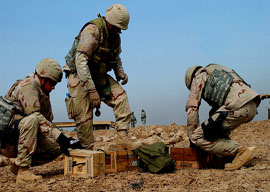
June 11, 2012

The Royal Engineers did anything the Army needed”from building bridges to crossing rivers, from building camps to clearing mines”so they needed to be tough soldiers. They needed to be able to take shit all day and all night and still carry on. They needed to never stop. There were mainly men in the ranks; most women in the Engineers were officers, though some bucked the trend and joined the lads at the bottom, but it wasn”t an easy place to be.
In training, the corporals”one in particular”put us to the test. We all called him a bastard in our beds as we slept the few hours he let us, but we didn”t dare call him anything to his face.
Bridges were important. They allowed the Army to move around the battlefield. They helped men and tanks get across rivers. The big metal bridges came in huge sections that eight men (and women) would have to lift into place and fit together. Some lads would get injured during the training. Building a bridge in the cold and the wet while being tired at night required concentration. In the new health-and-safety Army, we wore goggles and high-visibility vests during training, but some would still get injured.
As the wind buffeted soldiers around and the rain clouded goggles, some would put their fingers in the wrong places. As a large section of bridge was rattled into place, a wiry soldier from Newcastle tried to guide a knob into a hole and lost a finger for his efforts. A scream like a kicked cat pierced the cold air. The scream was fierce from someone who looked like he hadn”t ever eaten. Sweaty-backed soldiers stopped for a moment. Steam came off their backs and swear words out of their mouths. He was taken away quickly and the rest of us were told to carry on with the bridge. The corporal told us the enemy wouldn”t care how many fingers we lost. We got back on with it, lifting and knocking and hammering the bridge into place.
On some days the corporal would take us across country to toughen us up. The path to the training area was a rough road cut through the trees. We”d be ordered to get down onto our belt buckles, which meant lying on our bellies. The squad had around thirty men all shuffling around finding a space for themselves on the road, a dirty dusty road with small and big stones that dug into forearms and legs as we were told to leopard-crawl. The leopard crawl was a basic infantry move. It kept the soldier low to the ground and out of the enemy’s view or under his bullets. It would take an age to move the first few meters. The stones would dig and press into the forearms which would scratch and bleed, then they”d make a journey under your stomach which nearly tickled and then hurt again on the thighs pressing through cotton trousers.